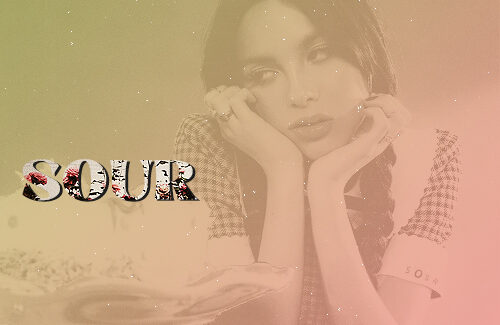Olivia Rodrigo released her highly anticipated debut album, “Sour,” on Friday.
The 18-year-old singer-songwriter burst into the spotlight earlier this year when her debut single, “Drivers License,” quickly became the biggest hit of 2021.
Insider’s music team (reporter Callie Ahlgrim and celebrity and music editor Courteney Larocca) listened to the new album on our own, jotting down our initial thoughts track by track.
Put simply, we’re obsessed. The 11-song collection draws from a vast array of influences, including ’60s psychedelia (“Deja Vu”), Paramore-flavored grunge (“Good 4 U”), acoustic balladry (“Enough For You”), and folksy storytelling (“Favorite Crime”). Strung together, it paints Rodrigo as a chameleonic vocalist, as well as one of the savviest songwriters working today.
Here is what we thought of each song on “Sour” upon first listen. (Skip to the end to see the only songs worth listening to and the album’s final score.)
“Brutal” is instantly magnetic.
AHLGRIM: Not to state the obvious, but opening your debut album with an off-the-cuff declaration (“I want it to be like, messy!”) is so perfect — and then to close the song with proof you weren’t kidding (“God, I don’t even know where to start”) is a brilliant full-circle moment.
Rodrigo invites you to dive into “Sour” headfirst, but warns you not to expect a polished pop persona. If her feelings are messy, her music should be, too.
Indeed, a big reason why Rodrigo’s songwriting is so powerful is that she seems hypnotically, almost obsessively, self-aware. “Brutal” is an ideal example of that power, though she might call it a vice.
“I’m so sick of 17 / Where’s my f—ing teenage dream?” is the new “I hate the headlines and the weather / I’m 19 and I’m on fire,” delivered this time with a healthy eye-roll. Rodrigo and Lorde both know how society loves a female wunderkind. It also loves to chew her up and spit her out.
So yeah, Rodrigo’s not falling for any of it. This is a girl who inspired frenzy and devotion with a song called “Drivers License,” and in the opening track, she pokes a hole in the circus tent: “I can’t even parallel park.”
To reduce “Brutal” to a teenage-angst banger, however, would be a disservice to the layers at work here. Questioning your identity, your looks, your reputation, your brain, who you love, where you fit into the world — these are lifelong struggles. Teenagers just tend to be more honest about them.
How much do I love this song? God, I don’t even know where to start.
LAROCCA: For the rest of this review I will be identifying as a teen. Ignore the fact that I turn 26 later this month — this song, and likely this entire album, are best served with a heaping helping of teenage angst. Thank God I never fully grew out of mine.
“Brutal” is a pop-punk banger that pulled me in so deeply, I instantly forgot I had an entire album to review as I hit the repeat button. Every line is delivered with more anguish than the last, until she shrugs it all off with a smirk (“God, it’s brutal out here”).
I do think it’s sad Rodrigo apparently relates to corporate burnout, so I’m choosing to believe her cowriter Dan Nigro came up with these lines: “And I’m so tired that I might / Quit my job, start a new life / And they’d all be so disappointed / ‘Cause who am I if not exploited.”
To be clear, this isn’t a complaint. It’s wildly relatable, but I’m not going to dig much further into it lest my boss reads this.
If “Brutal” is on full-boil, Rodrigo brings it back down to a simmer in the final moments to introduce her thesis statement: “Got a broken ego, broken heart / And God, I don’t even know where to start.”
“Traitor” is a masterful takedown wrapped in a beautiful package.
AHLGRIM: As the title suggests, “Traitor” is wily and skillful, mirroring the relationship Rodrigo resents. The sweet guitar strums and fluttery vocals obscure the torment within.
This song would feel right at home nestled on a tracklist next to “Dear John,” which is fitting, since “Speak Now” is Rodrigo’s favorite Taylor Swift album.
We all know Rodrigo is a devoted student in the Swiftian school of songwriting, and “Traitor” is an A+ in every category, from gently swooping melodies to coup de grâce couplets. “It took you two weeks to go off and date her / Guess you didn’t cheat, but you’re still a traitor” gave me full-body chills.
LAROCCA: Rodrigo slows things way down on “Traitor,” but that doesn’t mean she lost any of her edge.
She hones in on a failed relationship, realizing that maybe all her paranoia wasn’t irrational after all — despite the reassurances (see: “little white lies”) her partner was spouting before he jumped into another relationship with his so-called friend two weeks later.
It’s a unique, complex type of pain that she somehow succinctly cracks open with a single lyric: “Guess you didn’t cheat / But you’re still a traitor.”
I’m also thrilled to report that Rodrigo continues to understand the power of bridges. Although it’s astonishing that it took until 2021 for someone to come up with this couplet: “God, I wish that you had thought this through / Before I went and fell in love with you.”
It’s almost obvious in its diaristic delivery, but that’s what makes it the perfect hook — it’s the kind of line that heartbroken girls are going to be screaming at the top of their lungs on highways for years to come. I can’t wait to be one of them.
“Drivers License” will probably be the defining song of 2021.
AHLGRIM: My true first-listen review of this song would be the text I sent my friend immediately after hearing it: “Listen to this and tell me it’s not ‘Save Myself’ by Ashe plus ‘Melodrama.’ I’m fully obsessed. And also emo.”
His response? “Holy crap,” and then, “Why did this song make me cry?”
Since that fateful day in January, “Drivers License” has apparently become my all-time second-most streamed song on Spotify, an account I’ve had since 2013. (Ariana Grande’s “Needy” better watch her back.)
Every time I turn it on, I brace myself for disappointment. It couldn’t possibly be as magical the 5th, the 10th, the 200th time… right? Rodrigo has consistently proved me wrong.
My story is not unique. In fact, it’s so common that even “Saturday Night Live” had to get a piece of the action. So what can I say about “Drivers License” that hasn’t been said? It’s already one of the most iconic breakup songs in history, and rightfully so.
LAROCCA: I know this review is called a “first listen” but I don’t even want to try estimating the number of times I’ve listened to “Drivers License” since it crashed into our collective psyche four months ago.
However, if you are curious about my initial thoughts, there’s concrete proof that I was sending it around to everyone I know the weekend it dropped.
Clearly I, like anyone with ears, know this record-breaking track is quite likely the best song that will be released all year — that is, if there aren’t others on this very album that will surpass its excellence. It perfectly encapsulates the feeling of your first heartbreak — from the “I know we weren’t perfect but I’ve never felt this way for no one” to That Bridge.
It’s interesting to consider the context it was written in, too. “Drivers License” was written last year, while everyone was trapped indoors, listening to sad music, thinking back to happier times, with nowhere to go. Driving aimlessly through the suburbs while dissecting all of the feelings bubbled up inside your chest is an evergreen mood, but it hits closer to home when it’s all we could do with our time.
Whatever, you get it. This song is great, and you’ve likely heard it a zillion times by now. Or watched the “Saturday Night Live” sketch. Or seen her perform it at the BRIT Awards.
We can move on — or not. That’s the whole point, isn’t it?
“1 Step Forward, 3 Steps Back” interpolates Taylor Swift’s “New Year’s Day.”
AHLGRIM: It’s slightly distracting to anchor this song in the “New Year’s Day” piano riff, because my brain is immediately expecting to hear, “There’s glitter on the floor after the party.”
But the deeper Rodrigo gets into her own rendition, the more it works. The juxtaposition of Swift’s bright chords with Rodrigo’s self-doubt is very evocative. As Swift has said, there’s a lot of fear that comes with being in love.
“1 Step Forward, 3 Steps Back” definitely feels like a song Rodrigo wrote by herself in her bedroom, likely before the “Drivers License” frenzy, when “Sour” was still supposed to be an EP.
True, it’s less artful than her other songs — but it’s a taste of pure unfiltered Rodrigo, the person who covered “Cruel Summer” and shared rough piano demos before knowing that millions of people would hear them, or speculate about her personal life.
I also appreciate the peek into Rodrigo’s mindset when she was actually dating this boy, in the the throes of conscious-altering, sacrificial love; it gives the breakup songs more gravity.
LAROCCA: As a Professional Swiftie, the piano intro to Swift’s “Reputation” closer never fails to make my heart swell. But knowing Rodrigo previously said she couldn’t get in the headspace to write any love songs for “Sour,” the sample serves to juxtapose a relationship you stay in when it’s hard or it’s wrong or you’re making mistakes with one that could send you home crying at the end of the night.
Positioning this track immediately after “Drivers License” gives Rodrigo the opportunity to literally take three steps back. This appears to be the only track on the album that explores her emotions from within the relationship, as opposed to the tortured aftermath.
But while “1 Step Forward, 3 Steps Back” fills out our understanding of the relationship at the heart of “Sour,” its familiarity could result in getting lost in the shuffle among all these heavy-hitters.
“Deja Vu” is a perfect song.
AHLGRIM: I know I called “Drivers License” one of the most iconic breakup songs in history less than five minutes ago, and I stand by that. But part of me thinks I actually like “Deja Vu” better.
There is something so delirious and addictive about this song: the audible smirk in “so unique,” the whispered “I love you” buried in between the chorus and the verse, the controlled screaming in the bridge. I wouldn’t change one single thing about it.
LAROCCA: OK, I have a bone to pick with everyone who didn’t pull their weight in the pursuit of a No. 1 debut for “Deja Vu.” I was doing my part so where were all of you? This song is so clever and deserved more flowers than it ultimately received.
I’m not going to waste my time explaining this one — you’re either someone who already relistened to it enough times to finally hear the “I love you” buried deep after “Now I bet you even tell her how you love her / In between the chorus and the verse,” or you’re tasteless. Sorry!
“Good 4 U” is a delicious spoonful of punky pop-rock.
AHLGRIM: “Good 4 U” is what would happen if you put Paramore’s “Misery Business,” Demi Lovato’s “Don’t Forget” era, the explicit version of “Potential Breakup Song,” and the soundtrack of “Jennifer’s Body” in a blender.
It’s also the most cathartic song on the album. When I listen to “Good 4 U” at full volume, in the shower or in the car, I actually giggle with delight when Rodrigo abandons all poise: “Well screw that, and screw you!” I’ve rarely heard spite wielded so persuasively.
LAROCCA: “Good 4 U” sounds like a song that would’ve been included on the soundtrack for a Disney-adjacent movie in the early 2000s and I mean that as the highest form of flattery. As someone who has been incorporating Lindsay Lohan’s “Ultimate” from “Freaky Friday” into her regular listening lately, I can’t get enough.
Every second is pure unadulterated brattiness: the way she spits “Well, screw that and screw you;” the crescendo in the bridge; that final kill shot (“Like a damn sociopath!”).
Rodrigo is the main character, and listening to “Good 4 U” will make you feel like one, too.
“Enough For You” has some of the best lyrics on the album.
AHLGRIM: I’d like to point out how genius this sequence is. Looking at the tracklist, “Good 4 U” and “Enough For You” seem like a weird pairing because their titles are so similar. But the difference in syntax highlights an important tonal shift: the former is sarcastic and bitchy, while the latter brings Rodrigo back to earth, casting off her whimsical camouflage.
For the past two songs, Rodrigo has draped her pain in psychedelic teasing (“Don’t act like we didn’t do that s— too!”) and hyperbolic accusations (“Like a damn sociopath!”). Here, she lays herself bare.
Falling out of love is one thing, and getting dumped is quite another. But feeling inadequate in the eyes of someone you’d do anything for is an exquisite kind of anguish, and Rodrigo captures it beautifully, hauntingly, without flinching.
The song’s genius is solidified with a last-minute revision in the final chorus: “You say I’m never satisfied / But I don’t think that’s true,” becomes, “You say I’m never satisfied / But that’s not me, it’s you.” She finally makes the painful subtext explicit and it feels like a release, a mini liberation.
LAROCCA: “Enough For You” broke my heart in a way I hadn’t ever experienced before. As someone who, like Rodrigo, grew up admiring Swift for exposing her beating heart so I could better understand my own, I can deeply appreciate the excruciating vulnerability Rodrigo showcases here.
However, I’m no longer a young fan looking toward someone older and wiser. Instead, I’m seeing my past reflected back at me through the lens of someone younger, who’s experiencing that familiar pain like it’s brand new — because for her, it is.
I just want to give Rodrigo the biggest (fully vaccinated) hug — and tell her to keep writing, because there’s something so impressive and stunning about the way she makes sense of her sadness.
“Happier” reflects the stress and strain of post-heartbreak healing.
AHLGRIM: Rodrigo told The Guardian’s Laura Snapes that she wrote “Happier” on the set of “High School Musical: The Musical: The Series,” while the cast was filming “a really poppy, happy dance number.” She tucked herself away in between takes, armed with her acoustic guitar, and tried to regain some dignity.
If you’ve ever cried in the bathroom at work and then gone back to your desk as if nothing happened, this song might feel like a personal attack. (If you haven’t, you’re a liar.)
Rodrigo writes like she’s on the verge of combustion, and as Snapes notes, her delivery mirrors that tension. When the chorus spills out awkwardly, it recalls the strain of a forced smile. It’s an example of what Max Martin might call “incorrect songwriting,” which is a compliment.
LAROCCA: The chorus of “Happier” is a summation of the conflicting emotional palette spread out across these 11 tracks: “I hope you’re happy / But not like how you were with me / I’m selfish, I know / I can’t let you go / So find someone great but don’t find no one better.”
Rodrigo’s giving us the lyrical equivalent of a Sour Patch Kid: First she’s sour, then she’s sweet — until you take the next bite.
“Jealousy, Jealousy” is simultaneously fun, distressing, chaotic, and stylish.
AHLGRIM: “Jealousy, Jealousy” easily claims a top-three bridge on the album, along with “Drivers License” and “Deja Vu.” It roils and churns like the ocean is throwing a temper tantrum.
Rodrigo’s common sense is getting tossed around like a sailboat. Sure, she knows comparison is unhealthy and illogical. But as François Lelord wrote, “Knowing and feeling are two different things, and feeling is what counts.” (Maybe “Hector and the Search for Happiness” was one of the aforementioned self-help books Rodrigo read to impress her ex.)
Knowing that Rodrigo is a fan of Baby Queen, I wonder if this vibe was partially inspired by “Buzzkill,” which had the most rousing bridge of 2020.
Both artists write coming-of-age lyrics that are insightful and cutting, but never condescending. When Rodrigo rolls her eyes at “paper-white teeth and perfect bodies” on Instagram, she’s indicting her obsessive scrolling as much as anything else.
I dare anyone to try and reduce “Sour” to a “breakup album.” Rodrigo is tackling complex psychologies and societal ills that would daunt even the most seasoned songwriters, and she’s making it look stylish.
LAROCCA: Rodrigo often gets compared to Swift for her storytelling abilities and clear fandom — but Swift’s influence can’t be felt at all on “Jealousy, Jealousy.” Instead, Rodrigo seemingly came to the recording session after listening to Fiona Apple and Lorde. The alternative piano on the bridge could’ve been plucked right out of the ’90s, while the chorus sounds like it’d be right at home on the latter’s “The Love Club” EP.
The lyrics are tongue-in-cheek — even more so when you realize Rodrigo probably knew the song would draw co-com-comparisons to other artists.
And yet, I wouldn’t trust this song in anyone else’s hands; Rodrigo exudes the utter coolness this song requires, but she’s still a believable narrator. It’s not unimaginable that, even despite being 2021’s breakout star, she’s acutely familiar with the stomach drop that accompanies social media doom-scrolling, and coming to the conclusion that everyone’s living a better life.
“Favorite Crime” is a fascinating departure from Rodrigo’s hyper-literal writing style.
AHLGRIM: I love a song that’s built on an extended metaphor (“Hotel California,” “Take Me to Church,” “Getaway Car”) and “Favorite Crime” is plenty worthy to continue this tradition.
I don’t love that Rodrigo, who I’m coming to see as a sister-daughter hybrid, is willing to shoulder the blame for a boy’s mistreatment.
But the tapestry she weaves, using just a few kindred images, results in some of her most visceral storytelling yet (“One heart broke, four hands bloody,” “Every time a siren sounds / I wonder if you’re around”).
This track also boasts one of Rodrigo’s best vocal performances: warm, weary, yet completely in control, all at once. When those harmonies kicked in for the final chorus, I ascended to another dimension. I haven’t returned.
LAROCCA: “Favorite Crime” is one gut punch after another, swelling softly until the pace picks up on the bridge.
But the heartbreak quietly makes room for a glimpse of freedom.
In lines like, “‘Cause I was going down, but I was doing it with you,” Rodrigo is still very much entangled in the mess her partner left behind. But when she begins dueting with herself on the penultimate verse, she frees herself, stepping out of the wreckage on her own.
“Hope Ur OK” walks a delicate balance between heartbreaking and heartwarming.
AHLGRIM: I love how this song sounds like a letter. Not only is there no hook, but Rodrigo doesn’t simply repeat the same chorus — she adjusts along the way to fit the narrative. It makes the words feel more sincere, and the overall tone more intimate.
Rodrigo could have phoned in a structurally simple, stick-it-to-the-man anthem to close her album on a progressive note (Dua Lipa’s “Boys Will Be Boys” comes to mind). It could have felt corny, or manufactured by a brand specialist.
Instead, “Hope Ur OK” plays more like a heartfelt stream of consciousness that demanded to be heard.
LAROCCA: As I said earlier, this album is a Sour Patch Kid. So it makes poetic sense for it to end with something sweet.
The most Swiftian of all the songs on this tracklist, Rodrigo goes full storyteller on “Hope Ur OK” as she reflects back on two people she knew at different stages of her life, pondering where they ended up and sending well wishes to wherever they are.
The final lines — “God, I hope that you’re happier today / ‘Cause I love you, and I hope that you’re okay” – serve as a universal sendoff to these childhood pals, the album’s central romantic partner, and the listener themself. And when concerts inevitably return, it’ll take on a new life as thousands of fans sing it back to her, too.
Final Grade: 9.5/10
AHLGRIM: This is everything I could ever want from a pop album. If it had been released when I was 17 and heartbroken, I fear I would’ve changed my name to Olivia and tattooed “SOUR” on my forehead.
Luckily, I am 25 and slightly more secure, so I’ll settle for buying a “sociopath” t-shirt and belting “Brutal” at every karaoke bar I can find.
If “Drivers License,” “Deja Vu,” and “Good 4 U” are any indication — and it must be noted that Rodrigo has a prodigious talent for selecting singles — then I will only become more obsessed with “Sour” as it ages.
Every time I hear a new Rodrigo song, I’m like, “Oh OK, this one is my favorite.” Then I play it to death and wait to get tired of it, but never do.
I had a similar experience with this tracklist. I kept expecting to lose interest, kept bracing for impact — perhaps an underwhelming ballad, or an overcooked electro-pop mess. All I found was increasing awe. I suppose smart, vulnerable songwriting transcends the natural laws of fatigue.
I’d be suspicious of anyone who hears this album (I mean really hears it) and never once swoons, aches, or smolders with longing. The world is so big, the spectrum of musical taste so vast, yet in this album beats a tender heart. You can’t scoff at something so hungry and raw in any way that matters.
“Drivers License” became such a phenomenon for that exact reason, and many wondered if Rodrigo could ever top it. You’d be forgiven for making that assumption, but you’d still be wrong. “Sour” proves she’s here to stay, and it’ll likely go down as one of the great debuts in songwriting history.
LAROCCA: This album is a roller coaster of emotion, climbing toward acceptance, then dropping headfirst right back into sadness, passing through annoyance, jealousy, anger, and possessiveness along the way.
While I wish I could’ve experienced this with 17-year-old ears, I’m fortunate enough to belong in Rodrigo’s other core demographic: girls with water placements in their birth charts. (She is a self-proclaimed “spicy pisces” after all.)
I’m also a firm believer that teen girls have some of the best taste in music, and it’s been glorious to witness how the next generation’s songwriters will take inspiration from millennial artists, baring their own souls across shimmery synths and folksy guitar plucks. If Rodrigo is any foreshadowing of how Gen-Z is going to shape the music industry for years to come, then we’re driving in the right direction.
And while I joked in my “Brutal” review that I was identifying as a teen for my listening experience, there is a widespread appeal to the kaleidoscopic sentiments Rodrigo navigates throughout these 34 minutes.
After hearing it for the first time on May 11, a colleague of mine claimed he didn’t understand why everyone loved “Drivers License” so much. Yesterday, he willingly ate his words, admitting he hadn’t turned the track off in a week.
Don’t ever underestimate an 18-year-old girl with a broken heart, a guitar, and a deep understanding of Swift’s discography. She’ll sing you to tears.
Worth listening to:
“Brutal”
“Traitor”
“Drivers License”
“Deja Vu”
“Good 4 U”
“Enough For You”
“Happier”
“Jealousy, Jealousy”
“Favorite Crime”
“Hope Ur OK”
Background music:
“1 Step Forward, 3 Steps Back”
Split decision:
N/A
Press skip:
N/A
*Final album score based on songs per category (1 point for “Worth listening to,” .5 for “Background music,” .5 for “Split decision,” 0 for “Press skip”).












